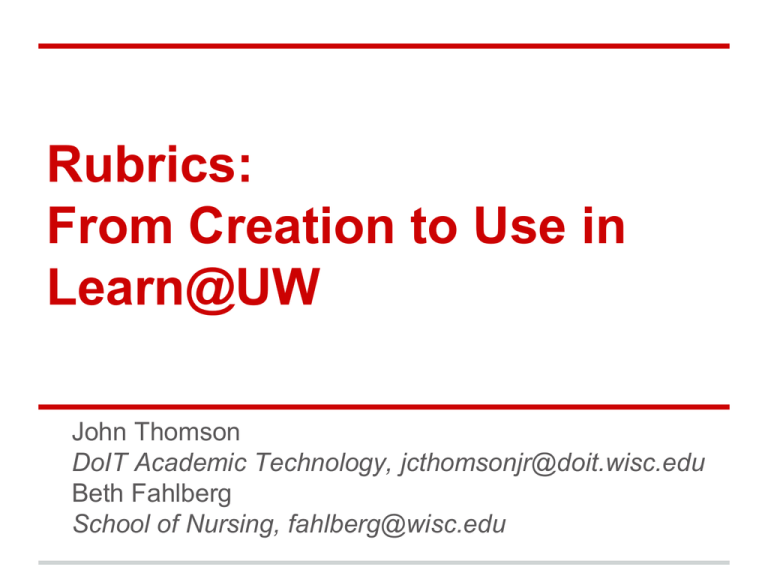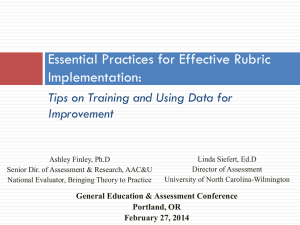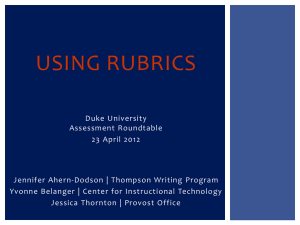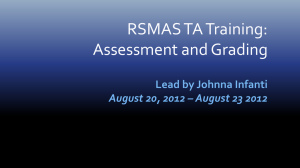Rubrics: From Creation to Use in Learn@UW
advertisement

Rubrics: From Creation to Use in Learn@UW John Thomson DoIT Academic Technology, jcthomsonjr@doit.wisc.edu Beth Fahlberg School of Nursing, fahlberg@wisc.edu Introduction to rubrics 1. Examples, benefits, drawbacks 2. Electronic rubrics in D2L (Learn@UW) 3. Experiences in a teaching team 4. Group work 5. Quick demonstration What is a rubric? Traditional rubric used in grading Benefits of using rubrics • • Provides direction for students before and after an assignment • Facilitates feedback • Promotes grading consistency Drawbacks of traditional* rubrics * Paper or document file rubric • Cumbersome & inefficient Process of grading using doc file rubrics 1. Open/ find student assignment 2. Open correct rubric file 3. Remember to save the rubric as a new file with the student's name in a place you can find it later 4. Grade assignment & enter feedback 5. Add up points 6. Enter grade in online gradebook 7. Upload correct file for correct student and assignment Drawbacks of traditional* rubrics * Paper or document file rubric • • • Possibility of error at several points Challenging to use information for assessment of learning outcomes Paper Rubrics Such Fun! http://magazine.uchicago.edu/0106/features/ WHAT IF??? Rubrics could be efficient as well as effective? Rubrics in Learn@UW Learn@UW Rubric- graded assignment Learn@UW Rubric performance feedback Grades & feedback easily edited & transferred from rubric to gradebook Benefits of Learn@UW Rubrics • Saves time!! • Reduces error • Promotes effective communication o o • Faculty-student Faculty-faculty Ease of access & revision Experiences of teaching team Barb King Paul Larson Fanglin Kuo • Rubrics were efficient for grading papers • Promoted consistency and communication between graders Nursing 433 Fall 2012 Clinical assessment rubric Document converted to online format, piloted with one group at two points in time Challenges: Making criteria specific enough Differentiating between each level • • Additional challenges with graded rubrics Ensuring assigned points are internally consistent with expectations and syllabus • Nursing 319, Spring 2013 Experiences using L@UW rubric for clinical performance evaluation Observations of performance and learning easily entered: At clinical site Reading weekly journals • • Better & more frequent feedback for students Streamlined evaluation process Rubric development in Learn@UW 1. Plan 2. Draft in D2L 3. Publish to grade student work Rubric development in Learn@UW Lingo: Analytic vs Holistic Criteria & Levels Range • • • Best used in: Dropbox Gradebook • • Be sure to distinguish between different criteria Group work: creating a rubric Find a partner! Using one of the example assignments, or one of your own, draft a rubric. Use the VALUE rubric as an example of good level definitions. Be ready to trade your rubric with another pair. Resources VALUE rubrics from AACU - institutional rubrics for essential learning outcomes http://www.aacu.org/value/rubrics/ iRubric - example rubrics from a number of disciplines http://www.rcampus.com/indexrubric.cfm Rubrics orientation in Desire2Learn (Learn@UW) https://kb.wisc.edu/27857 Creating & Editing a Rubric https://kb.wisc.edu/27621 Thanks! Q&A











